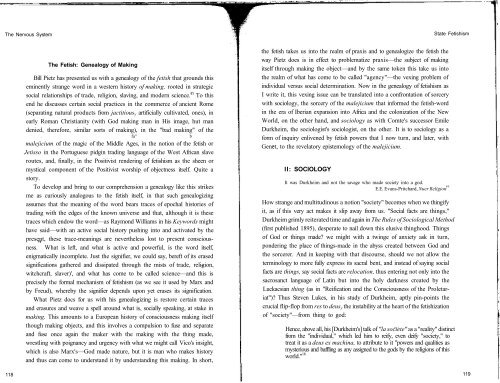The Nervous System - Department of English and Comparative ...
The Nervous System - Department of English and Comparative ...
The Nervous System - Department of English and Comparative ...
You also want an ePaper? Increase the reach of your titles
YUMPU automatically turns print PDFs into web optimized ePapers that Google loves.
<strong>The</strong> <strong>Nervous</strong> <strong>System</strong><br />
State Fetishism<br />
<strong>The</strong> Fetish: Genealogy <strong>of</strong> Making<br />
Bill Pietz has presented us with a genealogy <strong>of</strong> the fetish that grounds this<br />
eminently strange word in a western history <strong>of</strong> making, rooted in strategic<br />
social relationships <strong>of</strong> trade, religion, slaving, <strong>and</strong> modern science. To this<br />
end he discusses certain social practices in the commerce <strong>of</strong> ancient Rome<br />
(separating natural products from jactitious y artificially cultivated, ones), in<br />
early Roman Christianity (with God making man in His image, hut man<br />
denied, therefore, similar sorts <strong>of</strong> making), in the "bad making" <strong>of</strong> the<br />
fa"<br />
b<br />
malejicium <strong>of</strong> the magic <strong>of</strong> the Middle Ages, in the notion <strong>of</strong> the fetish or<br />
Jetisso in the Portuguese pidgin trading language <strong>of</strong> the West African slave<br />
routes, <strong>and</strong>, finally, in the Positivist rendering <strong>of</strong> fetishism as the sheen or<br />
mystical component <strong>of</strong> the Positivist worship <strong>of</strong> objectness itself. Quite a<br />
story.<br />
To develop <strong>and</strong> bring to our comprehension a genealogy like this strikes<br />
me as curiously analogous to the fetish itself, in that such genealogizing<br />
assumes that the meaning <strong>of</strong> the word bears traces <strong>of</strong> epochal histories <strong>of</strong><br />
trading with the edges <strong>of</strong> the known universe <strong>and</strong> that, although it is these<br />
traces which endow the word—as Raymond Williams in his Keywords might<br />
have said—with an active social history pushing into <strong>and</strong> activated by the<br />
present, these trace-meanings are nevertheless lost to present consciousness.<br />
What is left, <strong>and</strong> what is active <strong>and</strong> powerful, is the word itself,<br />
enigmatically incomplete. Just the signifier, we could say, bereft <strong>of</strong> its erased<br />
significations gathered <strong>and</strong> dissipated through the mists <strong>of</strong> trade, religion,<br />
witchcraft, slaver)', <strong>and</strong> what has come to be called science—<strong>and</strong> this is<br />
precisely the formal mechanism <strong>of</strong> fetishism (as we see it used by Marx <strong>and</strong><br />
by Freud), whereby the signifier depends upon yet erases its signification.<br />
What Pietz docs for us with his genealogizing is restore certain traces<br />
<strong>and</strong> erasures <strong>and</strong> weave a spell around what is, socially speaking, at stake in<br />
making. This amounts to a European history <strong>of</strong> consciousness making itself<br />
though making objects, <strong>and</strong> this involves a compulsion to fuse <strong>and</strong> separate<br />
<strong>and</strong> fuse once again the maker with the making with the thing made,<br />
wrestling with poignancy <strong>and</strong> urgency with what we might call Vico's insight,<br />
which is also Marx's—God made nature, but it is man who makes history<br />
<strong>and</strong> thus can come to underst<strong>and</strong> it by underst<strong>and</strong>ing this making. In short,<br />
the fetish takes us into the realm <strong>of</strong> praxis <strong>and</strong> to genealogize the fetish the<br />
way Pietz does is in effect to problematize praxis—the subject <strong>of</strong> making<br />
itself through making the object—<strong>and</strong> by the same token this take us into<br />
the realm <strong>of</strong> what has come to be called "agency"—the vexing problem <strong>of</strong><br />
individual versus social determination. Now in the genealogy <strong>of</strong> fetishism as<br />
I write it, this vexing issue can be translated into a confrontation <strong>of</strong> sorcery<br />
with sociology, the sorcery <strong>of</strong> the malejicium that informed the fetish-word<br />
in the era <strong>of</strong> Iberian expansion into Africa <strong>and</strong> the colonization <strong>of</strong> the New<br />
World, on the other h<strong>and</strong>, <strong>and</strong> sociology as with Comte's successor Emile<br />
Durkheim, the sociologist's sociologist, on the other. It is to sociology as a<br />
form <strong>of</strong> inquiry enlivened by fetish powers that I now turn, <strong>and</strong> later, with<br />
Genet, to the revelatory epistemology <strong>of</strong> the malejicium.<br />
II: SOCIOLOGY<br />
It was Durkheim <strong>and</strong> not the savage who made society into a god.<br />
E.E. Evans-Pritchard, Nuer Religion<br />
How strange <strong>and</strong> multitudinous a notion "society" becomes when we thingify<br />
it, as if this very act makes it slip away from us. "Social facts are things,"<br />
Durkheim grimly reiterated time <strong>and</strong> again in <strong>The</strong> Rules <strong>of</strong> Sociological Method<br />
(first published 1895), desperate to nail down this elusive thinghood. Things<br />
<strong>of</strong> God or things made? we might with a twinge <strong>of</strong> anxiety ask in turn,<br />
pondering the place <strong>of</strong> things-made in the abyss created between God <strong>and</strong><br />
the sorcerer. And in keeping with that discourse, should we not allow the<br />
terminology to more fully express its sacral bent, <strong>and</strong> instead <strong>of</strong> saying social<br />
facts are things, say social facts are relocation, thus entering not only into the<br />
sacrosanct language <strong>of</strong> Latin but into the holy darkness created by the<br />
Luckacsian thing (as in "Reification <strong>and</strong> the Consciousness <strong>of</strong> the Proletariat")?<br />
Thus Steven Lukes, in his study <strong>of</strong> Durkheim, aptly pin-points the<br />
crucial flip-flop from res to deus y the instability at the heart <strong>of</strong> the fetishization<br />
<strong>of</strong> "society"—from thing to god:<br />
Hence, above all, his [Durkheim's] talk <strong>of</strong> "la societe" as a "reality" distinct<br />
from the "individual," which led him to reify, even deify "society," to<br />
treat it as a deus ex machina, to attribute to it "powers <strong>and</strong> qualities as<br />
mysterious <strong>and</strong> baffling as any assigned to the gods by the religions <strong>of</strong> this<br />
world." 18 119<br />
118
















